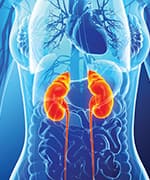Life Extension Magazine®
Lithium Benefits Kidneys
New research published in the Journal of Clinical Investigation suggests that lithium may help protect against kidney decline.*
Inhibiting the glycogen synthase kinase 3-beta (GSK3-beta) enzyme in cells supports kidney health in preclinical models.
Lithium has been shown to inhibit GSK3-beta.
Researchers have also observed that psychiatric patients treated long-term with lithium carbonate exhibited better kidney function than age-matched patients who did not receive it.
Their research suggested that less than a third of the dose used for bipolar disorder significantly blocks GSK3-beta activity in the kidney.
Editor's Note: Lithium has been used for many years as a treatment for bipolar disorder, and more recently was also found to extend the lifespan of roundworms and fruit flies.
* J Clin Invest. 2022 Feb 15. ;132(4):e141848.
N-Acetylcysteine Could Help in Older Patients' Concussion Recovery
A pilot study revealed improvement in symptoms of concussion among older men and women with mild traumatic brain injury who received supplements containing N-acetylcysteine (NAC), the Journal of Trauma Acute Care Surgery reported.*
The study included 65 traumatic brain injury patients who were within three hours of trauma surgery service evaluation.
Thirty-four patients received standard treatments for traumatic brain injury plus 4 grams of NAC within three hours of injury, followed by a 3-day period during which 2 grams of NAC was administered twice per day and an additional 3 days during which 1.5 grams of NAC was provided twice daily.
The remainder of the participants received standard treatment alone. Questionnaires that evaluated post-concussion symptoms were administered at the beginning of the study and at 7 and 30 days.
While questionnaire scores were similar at the beginning of the study, they were significantly better in the NAC group on days 7 and 30.
Editor's Note: The authors concluded that, "N-acetylcysteine was associated with significant improvements in concussion symptoms in elderly patients with mild traumatic brain injury. These results justify further research into using NAC to treat traumatic brain injury."
* J Trauma Acute Care Surg. 2022 Apr 8.
Melatonin Improves Heart Failure Patients' Lives
Stable heart failure patients with reduced ejection fraction (when left ventricle of the heart fails to contract normally) who consumed a nightly melatonin supplement, experienced a reduction in a marker of heart failure and better quality of life compared to patients who received a placebo, the journal Clinical Cardiology reported.*
The clinical trial included 85 patients who received 10 mg melatonin or a placebo nightly for 24 weeks.
Levels of NT-pro BNP which, when elevated, may be an indicator of heart failure, were similar in the melatonin-supplemented group and the placebo group at the beginning of the trial.
At the end of the trial, NT-pro BNP declined to 221.1 ng/L among participants who received melatonin compared to 332.1 ng/L among those who received a placebo.
Lower NT-pro BNP blood levels are an indicator of reduced heart failure severity.
Editor's Note: Melatonin-supplemented participants also experienced significant improvements in clinical outcome, quality of life, and New York Heart Association classification of heart failure, compared to the placebo group.
* Clin Cardiol. 2022 Apr;45(4):417-426.
Compounds for Preserving Bone Health
Bone health is maintained by two key cells called osteoblasts, which differentiate into osteocytes (bone cells), and osteoclasts, which break down old bone so that osteoblasts can form new bone.
The health and function of osteoblasts and osteoclasts is regulated by pathways which have been found to be activated by ‘cellular' proteins such as sirtuin 1, AMPK, and Nrf2.
Researchers have reviewed bone preserving mechanisms of specific nutrients that regulate these cellular proteins.*
SIRT1 is increased by melatonin, nicotinamide riboside, glucosamine and thymoquinone, found in black cumin seed oil. (Resveratrol long ago demonstrated potent SIRT1 activation.)
Nutrients such as gynostemma pentaphyllum and the drug metformin are compounds that activate AMPK.
Nrf2 regulates the cells' defense against oxidative stress. Lipoic acid, melatonin, thymoquinone, astaxanthin and sulforaphane can promote Nrf2 activity.
Editor's Note: "Regimens providing a selection of these nutraceuticals in clinically meaningful doses may have an important potential for preserving bone health," the authors concluded. "Concurrent supplementation with taurine, N-acetylcysteine, vitamins D and K2, and minerals, including magnesium, zinc, and manganese, plus a diet naturally high in potassium, may also be helpful in this regard."
* Int J Mol Sci. 2022 April 26;23(9):4776.





